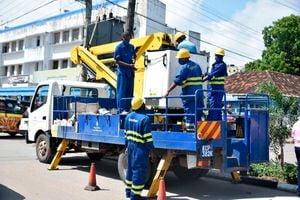
Paul Njuguna at his cooking oil processing plant in Kitale.
Upon retirement in 2019, Paul Njuguna Mwangi, 65, invested Sh10 million in an edible sunflower oil factory in his home county of Trans Nzoia.
A former technical manager at Agricultural Development Corporation (ADC), he had financed the project through a bank loan, backed by his retirement benefits.
As a sole proprietor, he acquired a processing and refining machine from China and set up a processing plant operating as Elgon Fine Enterprise Limited at his home in Lessos, Kwanza Sub-County in Trans Nzoia.
The business grew steadily and he even secured a market for his products in supermarkets and wholesalers from as far as Nairobi.
It wasn’t until August 2021, that he received an alleged erroneous power bill of Sh417,972 for his growing cottage industry.
It would mark the beginning of his frustrations, as he was forced out of business due to the subsequent disconnection of power by Kenya Power and Lighting Company (KPLC) in November 2021.
This gave birth to a legal battle at the Energy and Petroleum Judicial Tribunal where he sought justice.
Court documents seen by the Nation show that his cottage industry, which used a three-phase electric power supply, was forced to close down due to lack of power supply for eight months.
Mr Mwangi said he complained vide Ref 21993404 to the Energy and Petroleum Regulatory Authority (Epra) over the power disconnection arising from the alleged erroneous disputed bill that pushed him to huge financial losses.
The Energy and Petroleum Tribunal convened a sitting in Nairobi in a March 7, 2024 hearing - EPA/E012/2022 between Mr Paul Njuguna Mwangi and KPLC, after months of unsuccessful efforts by Epra to resolve the matter between the parties amicably.
KPLC, the first respondent, failed to provide a detailed record of units consumed by the appellant to the tribunal and was found culpable for disconnecting his power despite instructions by the energy regulator to reconnect the cottage industry.

Paul Njuguna at his cooking oil processing plant in Kitale.
In a judgment delivered on March 26, 2024 by the vice chairperson Doris Kinya Mwirigi, the tribunal found that the appellant remained without power for a prolonged period of eight months because of non-adherence by the 1st respondent and the regulator to applicable provisions of the Energy Act of 2019, and that the power company did not comply with its own service delivery standards.
In its disposition, the tribunal ordered that the Sh417,972 power bill was not justifiable and ordered Mr Mwangi not to pay the amount as it slapped KPLC with the cost of the case.
Mr Mwangi is now seeking compensation of Sh2.4 million for the eight months he was out of business. He told the Nation that he lost his market and has only remained with a third of his customers.
In an interview with the Nation, the proprietor said the lack of alternative sources of power pushed him out of business since his factory can only take up a three-phase power supply.
“I used to make about Sh300,000 per month before the disconnection of power, but now I make about Sh100,000, which means I am struggling in the business and that is why I am seeking compensation from the government to help me get back on my feet,” he said.
He noted that his investment suffered a huge setback after most of the farmers he had contracted for the raw material terminated their contacts after his industry closed due to a lack of power source.
“I am seeking compensation for general damages because my business was affected. I have lost many farmers who were supplying me with sunflower for edible oil extraction,” he said.
He expressed disappointment that efforts to have a sweeter retirement as a local investor have been affected and called on the government to support and protect local investors to boost the local economy.
“You can imagine now I am thinking about how I will raise Sh10 million to set up a solar power system as my alternative source of power, since the market monopoly by Kenya Power is affecting many investors just like me. The government should set up better policies to protect local investors,” he stated.











